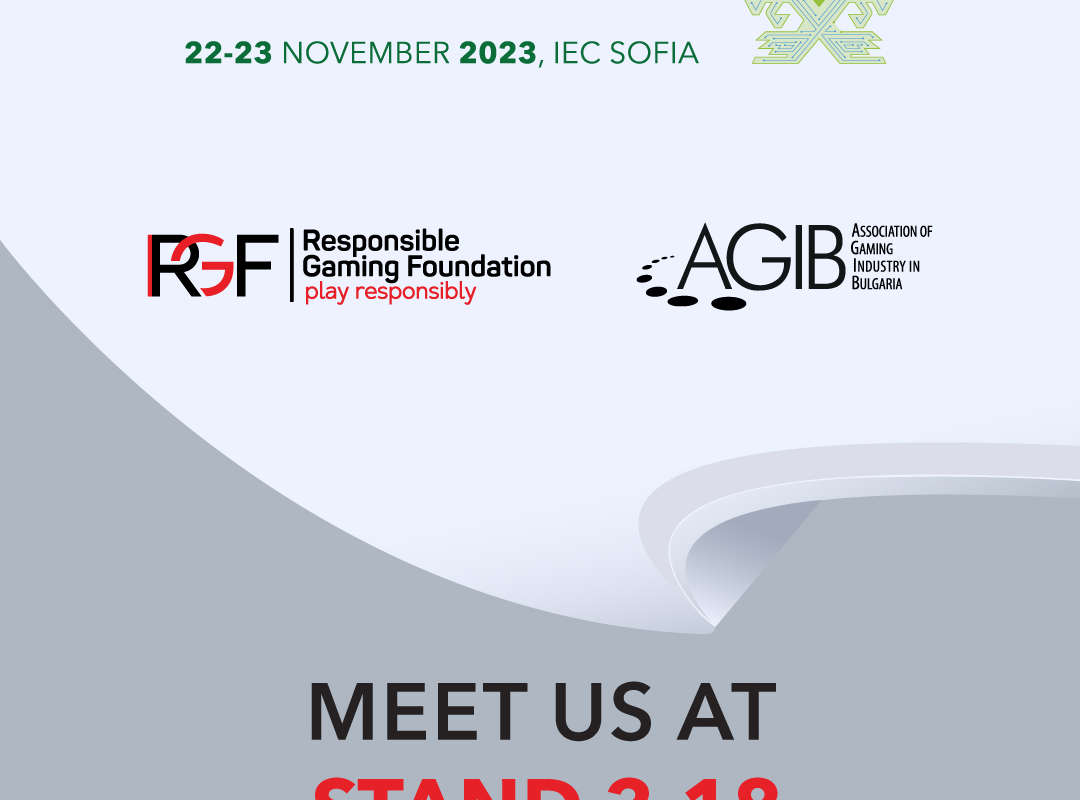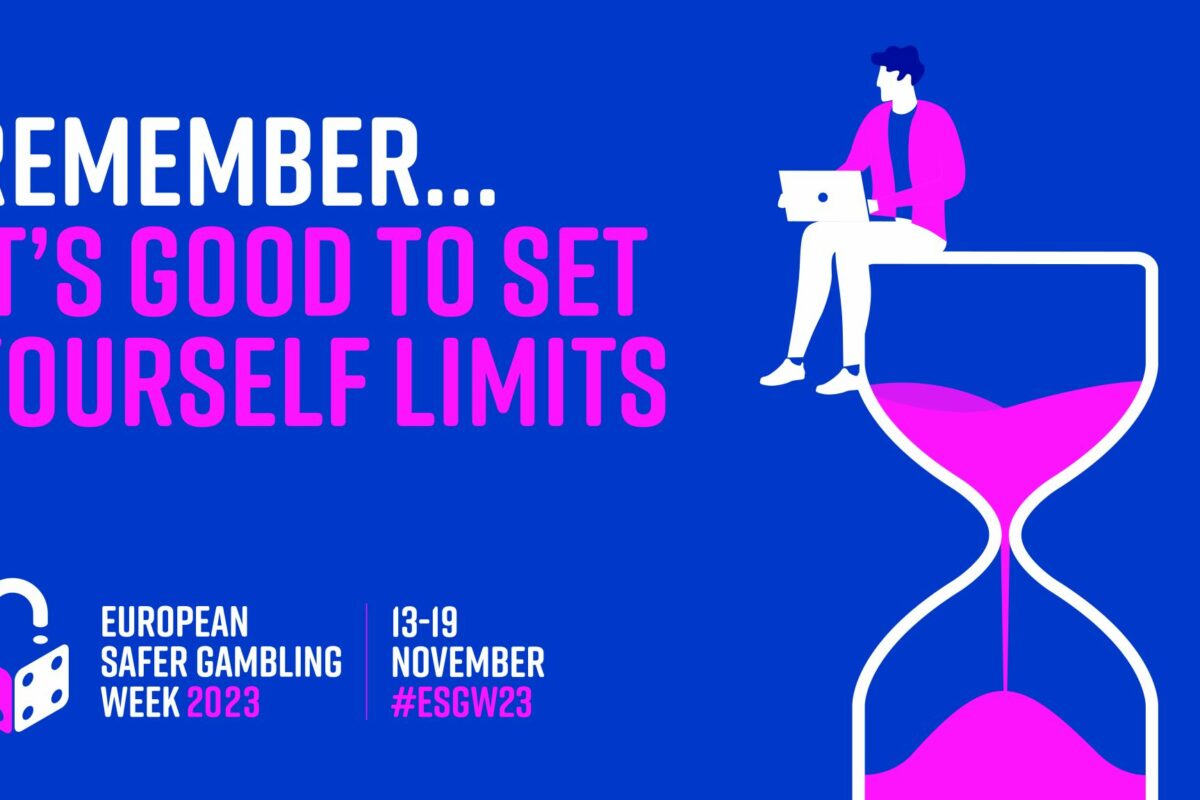The Association of the Gaming Industry in Bulgaria (AGIB) and the Responsible Gaming Foundation (RGF) will participate together in this year’s edition of the Balkan Entertainment and Gaming Expo – BEGE 2023. The common stand of both organizations will be located in hall 3 and can be found under number 3.18.
The Association and the Foundation are long-standing partners and have jointly implemented a number of initiatives, including joint trainings and seminars promoting responsible gaming behavior. The last joint initiative of the Association of the Gaming Industry in Bulgaria and the Foundation – “Responsible Gaming: on focus”, started in October 2023. The aim of the initiative is to promote the policies of reasonable behavior when using the products of the gaming industry; to work towards increasing the culture of users regarding responsible gaming behavior and the level of understanding of responsible gaming.
BEGE 2023 will be held on November 22 and 23 at the Inter Expo Center in Sofia. The exhibition annually gathers various representatives from both the gaming and entertainment industry, as well as non-governmental organizations, operators, regulators, producers and providers of gaming content. The event is accompanied by the EEGS conference, which includes a Master Class and an Affiliate Conference.
See what the principles of responsible gaming are.
Responsible Gaming Foundation took participation in European Safer Gambling Week of The European Gaming and Betting Association (EGBA)
Responsible Gaming Foundation took part in the European Safer Gambling Week organized by The European Gaming and Betting Association (EGBA). This participation underscores Responsible Gaming Foundation’s commitment to promoting responsible gambling practices and ensuring a safe and enjoyable gaming environment for players in Bulgaria and across Europe.
The objective of the event is to raise awareness about responsible gaming. Experts from all over the world will gather to share their experience and to discuss the latest developments in safer gaming regulations and research. Part of the topics to be addressed were Markers of Harm: Trustworthy Tools to Minimise Gambling Related Harm; Safer Gambling Interactions: How to Measure Success? and more.
Responsible Gaming Foundation’s involvement in the European Safer Gambling Week aligns with its ongoing efforts to promote responsible gambling within the gaming industry. By participating in this initiative, Responsible Gaming Foundation aims to raise awareness about the importance of responsible gaming practices, including measures to prevent problem gambling and support individuals who may be at risk.
More information: Home Page – EGBA
Gaming Addiction: Recognizing, Coping, and Treating
Dr. Mariana Todorova
In the age of digital connectivity, the allure of video games has captured the imaginations of people across age groups, and adolescents, in particular, find themselves immersed in this ever-evolving virtual realm. However, it is crucial to acknowledge that gaming addiction is a real and burgeoning concern. As many teenagers grapple with the challenge of limiting the time spent on video games, the line between recreational engagement and addiction becomes increasingly blurred. In some instances, gaming can assume the central role in an individual’s life, leading to adverse consequences that reverberate through physical and mental health and social relationships. For those seeking a way out, it’s paramount to consider game addiction treatment.
Process Addiction: A Comprehensive Understanding
Gaming addiction, classified within the spectrum of process addictions, is a subset of behavioral addiction. Process addictions are characterized by an irresistible impulse to engage in specific behaviors despite the manifest negative repercussions. Other manifestations of process addiction encompass gambling, shopping, and food-related compulsions. The pervasive nature of these addictions underscores the broader concept of process addictions, wherein behavioral patterns are the focal point of concern.
Recognizing the pernicious grip of gaming addiction involves discerning a series of warning signs:
Neglect of Social and Personal Obligations: The addiction takes precedence over friendships, hobbies, and other interests.
Decline in Personal Hygiene: Individuals may disregard personal grooming and basic self-care.
Inability to Adhere to Time Limits: Efforts to curtail gaming time prove futile, with individuals consistently exceeding self-imposed restrictions.
Mood Perturbations: The inability to access games can trigger anxiety, anger, and irritability.
Sleep and Appetite Disruptions: Changes in sleep patterns and eating habits that correlate with gaming habits may become evident.
Emotional Outbursts: Prohibiting or limiting gaming may elicit emotional outbursts.
Academic and Professional Deterioration: A decline in academic or professional performance may manifest as gaming takes precedence over responsibilities.
Withdrawal from gaming addiction mirrors the experiences of individuals grappling with other forms of addiction, often giving rise to symptoms such as anger, depression, and loneliness. It is incumbent to recognize that, in contemplating how to quit a gaming addiction, devising a structured plan is indispensable to navigate the intricate process of addiction recovery.
Navigating the Path to Recovery
For those who have acknowledged their gaming addiction or seek to assist a teen in addressing this issue, there are five pivotal steps to facilitate a successful journey toward rehabilitation:
Establish Stringent Time Limits: Experts in child health emphasize the importance of limiting screen time, recommending that school-aged children spend no more than two hours daily in front of screens. For those aiming to reduce gaming time, initiating a 30-minute daily limit, supported by alarms or reminders from friends, can be a salient starting point.
Reclaim the Bedroom: Removing gaming devices from the bedroom is essential to curtail impulsive gaming. This practice not only minimizes easy access but also combats the adverse effects of late-night gaming on sleep quality.
Leverage Social Networks: Openly discussing concerns about gaming addiction with friends and family is a vital step. Alternatively, initiating conversations about engaging in more social activities can be an indirect yet effective approach to mitigate excessive gaming.
Adopt Alternate Stress-Relief Techniques: Gaming often serves as a stress-reliever for many. Consequently, developing alternative coping mechanisms is pivotal in managing and reducing gaming time. Exploring meditation, yoga, physical exercise, and creative expressions such as painting, writing, or music can provide a means of alleviating stress without resorting to excessive gaming.
Consider Gaming Addiction Treatment: In cases where self-regulation proves challenging, and gaming addiction remains uncontested, seeking professional intervention becomes paramount. Institutions like Foothills at Red Oak Recovery offer tailored treatment services designed to address gaming addiction. Their array of therapies encompasses individual and family therapy, cognitive-behavioral therapy, adventure therapy, equine-assisted therapy, and wilderness therapy.
The prompt pursuit of treatment is integral to averting gaming addiction from assuming a debilitating grip on one’s life. Detecting early signs of gaming addiction in adolescents is a parental responsibility, necessitating immediate action and intervention. By acknowledging the potency of gaming addiction, engaging in open conversations, and availing oneself of professional treatment options, individuals and their families can take affirmative steps towards recovery and restoration of a balanced and fulfilling life.
On focus: Responsible Gaming
The initiative “On Focus: Responsible Gaming” is launching in Bulgaria this October.
During the initiative, a number of events aimed at raising awareness of problem gambling behavior will be held, including seminars, webinars, meetings with psychologists and experts.
The aim is to promote the policies of reasonable behavior when using the products of the gaming industry; to work towards increasing the culture of users regarding responsible gaming behavior and the level of understanding of responsible gaming.
Speakers from the most authoritative international organizations will take part in the initiative, which for years have been involved in the creation of responsible gaming policies and practices, setting the main trends followed by the industry on a global scale.
The organizations are GameCare, EPIC Risk Management, Ygam, University of Gibraltar.
Each operator can include their representatives in the webinars, as well as attend the events, while promoting on their channels the specially created messages of the initiative, which will be provided to them by the Foundation.
The first webinar will be on October 5th at 1 p.m. on the topic “Fostering a responsible culture in consumers and society”. The speaker is Matt Burgiss from the largest non-governmental organization for responsible gaming – GamCare.
A responsible and united industry will guarantee a good perspective for sustainable development of the sector. When all representatives of the industry promote reasonable behavior together, the resonance in society will be strong enough and will lead to a gradual and effective change of attitudes towards the industry.
Check your game with the self-assessment test of Responsible Gaming Foundation
The gambling can be fun form of entertainment for many people, but in some cases, it could lead to problems. If you find yourself spending more money or time on gambling than you intended, it may be worth considering using a self-assessment test to evaluate your gambling habits.
Responsible Gaming Foundation and a team of experts have developed a special questionnaire that will help you examine whether you have unreasonable gaming behaviour. Based on your answers to these questions, the tool can determine your level of risk for developing a gambling problem and provide recommendations for reducing your risk.
Gambling problems can manifest in a variety of ways, including difficulty controlling your gambling behaviour, continuing to gamble despite negative consequences, and feeling a strong urge to gamble. By taking a self-assessment test, you can identify whether you are exhibiting any of these signs and take steps to address them.
*It is important to note that self-assessment tests are not diagnostic tools, and they cannot definitively diagnose a gambling problem. However, they can provide valuable insights into your gambling habits and help you identify areas where you may need to make changes.





